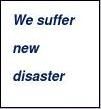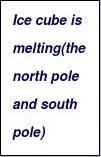
1. who:
Al Gore, former Vice President of the United States.(He served as the forty-fifth Vice President of the United States from 1993 to 2001 under President Bill Clinton.)
Global warming
2. when:
The movie was published in 2006.
3. Where:
All over the world, especially the USA.
4. Why:
Global warming is more and more serious that influence many things, including ourselves.
5. How:







6. My opinion:
Global warming bring us many disasters and pains. How can we face it?
? Take public vehicles as much as possible
? Build more energy-saving buildings
? Use environment-friendly fuel/power, like solar power, electricity driven vehicles
? Improve technology ……
As the movie says ”each one of us are cause of the warming, but each one of us can make choice to change that.”Maybe it's a shallow issue from me, but I'm trying my best.
第二篇:难以忽视的真相 An Inconvenient Truth 英文影评
难以忽视的真相 An Inconvenient Truth 英文影评 review by James Berardinelli
The problem with An Inconvenient Truth isn't the message; it's the messenger. If the film's goal is to educate and warn about Global Warming, why use one of the most divisive political figures of the last decade as the spokesman? I don't have a problem with Al Gore, but how many Republicans (and possibly even Independents) are going to be interested in spending 100 minutes listening to the ex-Vice President talking about Global Warming? Thus, instead of a wake-up call, this film - which is an excellent primer about the situation - turns into a sermon for the choir. The documentary makes two additional missteps that hurt its credibility and will diminish its widespread acceptance. There are times when, via biographical snippets and personal reflections from its central figure, it seems to be more about Gore than Global Warming. And, despite what others have written, there is a clear, albeit subtle, political bias. When the film wants to illustrate the obtuseness of politicians concerning Global Warming, it uses sound bytes from several prominent men - all Republicans. Would it have been so hard to find an anti-Global Warming Democrat to strike a sense of balance? All this is fine - director Davis Guggenheim has a right to slant his film any way he wants to - but it limits the film's appeal and consumer base.
Content-wise, An Inconvenient Truth contains compelling information. It also avoids the polarization that often surrounds discussions of Global Warming. Like an anti-Conspiracy Theory movie, it debunks several of the myths perpetrated by those who ignore scientific data while not embracing the sky-is-falling hysteria embraced by some fringe believers. When it's not giving us glimpses into Al Gore's childhood or recapping the 2000 election, An Inconvenient Truth sticks to the science of the situation. There are charts and graphs and, perhaps most disturbingly, "before and after" pictures of glaciers as they were 30 years ago and as they are today. (It gives "shrinkage" a whole new meaning.) If the movie comes across as alarmist, that's because the situation is alarming, not because the filmmakers are employing hyperbole. As is pointed out, Global Warming is viewed within the scientific community as a fact, not a theory. It's only Big Business, with its desire to maximize profits (after all, it costs money to cut back the amount of carbon dioxide escaping into the atmosphere) that has tried to position Global Warming as a subject that is open to debate.
If you have studied the subject at any length, the film is not going to provide any new material. This is a well-packaged recap of known facts. If you accept that Global Warming is real and understand its implications, you can easily skip An Inconvenient Truth. If not, then this becomes an important film to consider. Although it deals with scientific realities, it couches its message in words and images that the layman can understand. There's only one instance in which it enters scientifically uncertain territory: trying to link Hurricane Katrina with Global Warming. Is it possible that there's a connection? Yes, but it's not proven, and the cyclical nature of hurricanes makes this a dubious argument.
v The film is inherently non-cinematic. It could almost be considered a "concert film" (although without the music - don't worry, Al Gore don't pretend he's on American Idol), since it's essentially a filmed version of one of Gore's well-known Global Warming slideshows. For about 90 minutes of the 100-minute running time, Gore talks to us (he doesn't lecture) about the subject, using a variety of slides (and even an animated cartoon) to make his point. It should be no surprise that the presentation is as polished as it is - Gore estimates he has given it more than 1000 times over a span of more than 20 years.
Despite its flaws and the familiarity of the material, I was engaged by the movie. The clarity and simplicity of the presentation is remarkable. Gore is a likable, confident, humorous speaker. And the material reminds us of the need for vigilance. If only a few viewers learn some things about Global Warming, then the movie has done a worthy job. However?Critics are constantly reminded to review the movie that exists, not the one that doesn't, but in the case of An Inconvenient Truth, the message is so important that I can't help but wonder if this doesn't constitute, on some

level, a missed opportunity.
2
Critics have labeled Al Gore and his decades-long crusade to curb global warming as "alarmist." But if you've been warning people that the sky is falling for more than 20 years and it really is falling (or at least heating up), don't you have an obligation to sound an alarm?
The highly persuasive documentary "An Inconvenient Truth" captures Gore delivering a multimedia presentation he has given an estimated 1,000 times since 1989. The talk is augmented with an impressive array of graphs, animation, anecdotes and statistics that convey a flurry of facts,
projections and conjecture, all pointing to the ill effects the present rate of emissions has on the environment. A film with a clear point of view (and little room for others), it is the inspiration of producers Laurie David and Lawrence Bender, who attended Gore's lecture, decided it had to be made into a film to broaden the reach of its message and recruited director Davis Guggenheim to shoot it.
Guggenheim intercuts the lecture with footage of Gore on the road, studiously working out his presentation on his ubiquitous laptop, and segments that effectively show the crucible moments in his life that led him to continually rededicate himself to this topic. There's the college professor who first taught him about climate change in the late 1960s, the death of Gore's sister Nancy from cancer and the 1989 accident that nearly claimed the life of his son. While the vignettes establish Gore's long-term commitment, unfortunately there's a slickness to them that plays like a campaign film that might be shown at a political convention. Gore might not be anybody's idea of a pitchman, but here he's matched with the right topic, one for which he demonstrates real passion. He's charming, intelligent, professorial and one might even say … presidential. In fact, more than one observer has commented that if this Al Gore had been more visible during the 2000 election there may have been a different outcome. Rather than alarmed, Gore comes off as poised, relaxed and confident. Guggenheim sets up Citizen Al as part rock star, part eco-Buddha. He introduces himself to a small audience saying, "I'm Al Gore, and I used to be the next president of the United States." The line gets a laugh and quickly addresses the considerable baggage that comes with being on the losing end of one of the most divisive political outcomes in U.S. history. This position has its pros and cons for the film. On the plus side, Gore stands tall as an insider pushed to the fringe, a man on a mission with nothing to lose. He's able to attack the issue without equivocation. On the minus side, it's easy for naysayers to claim that the digs he makes at conservatives are sour grapes and he's merely positioning himself to run again in 2008 — though this would appear to be a longshot issue on which to do so.
The environment has not resonated much with voters or politicians in the past, though the increasing popularity of hybrid cars and eco-friendly products and services might indicate a shift in attitudes. That something so important could be largely ignored for so long is almost inconceivable, and among the things the film does well is an analysis as to why that is.
A 2004 Science magazine survey of more than 900 peer-reviewed academic papers on the subject of global warming found that all supported the
reality while none contested it. However, a like sampling of mainstream media found that 53% of the stories portrayed global warming as something that was in doubt in the scientific community. The mixed message has kept the automobile and oil industries in the driver's seat and the issue out of political debates.
Gore also does an excellent job of explaining the basic science behind climate change and the accelerated rise in temperatures since the 1970s. What could be very dry material is enlivened by Gore's geniality and desire to share the information. The potential for dreaded heaviosity is leavened at times by his dry wit and humorous moments, such as a clip from Matt Groening's animated series "Futurama."
Real and projected catastrophes reveal what is at stake. Glacier erosion, the threat to wildlife and the spread of deadly viruses make for some terrifying scenarios. Hurricane Katrina and other weather-related
disasters that occurred in late 2005 are included, giving the film a sense of timeliness and a powerful visual element, which Gore compares to "a nature hike through the Book of Revelations."
The other strong point that Gore makes is to dispute the "either/or" argument presented by big business when it comes to making the necessary changes. He uses Upton Sinclair's quote, "It is difficult to get a man to understand something when his salary depends upon his not understanding it," to not-so-subtly stress the motivation behind this line of thinking. The film's title refers to politicians' apprehensiveness in addressing the problem. Attempts at strict environmental reform have long been met with gloomy projections from the right of economic disaster in the form of lost jobs and factory closures, and Gore rebuts this by suggesting that green business can be good business.
Although the message of the film sounds bleak, it is actually quite rousing. Gore offers measures that can be taken on personal and community levels but also stresses that major changes require a larger response. The film's ultimate significance is that this requires political will — which Gore labels a "renewable resource" — and that if our present representatives

are not up to the challenge, we elect men and women who are.
3
I want to write this review so every reader will begin it and finish it. I am a liberal, but I do not intend this as a review reflecting any kind
of politics. It reflects the truth as I understand it, and it represents, I believe, agreement among the world's experts.
Global warming is real.
It is caused by human activity.
Mankind and its governments must begin immediate action to halt and reverse it.
If we do nothing, in about 10 years the planet may reach a "tipping point" and begin a slide toward destruction of our civilization and most of the other species on this planet.
After that point is reached, it would be too late for any action. These facts are stated by Al Gore in the documentary "An Inconvenient Truth." Forget he ever ran for office. Consider him a concerned man speaking out on the approaching crisis. "There is no controversy about these facts," he says in the film. "Out of 925 recent articles in peer-review scientific journals about global warming, there was no disagreement. Zero."
He stands on a stage before a vast screen, in front of an audience. The documentary is based on a speech he has been developing for six years, and is supported by dramatic visuals. He shows the famous photograph "Earthrise," taken from space by the first American astronauts. Then he shows a series of later space photographs, clearly indicating that glaciers and lakes are shrinking, snows are melting, shorelines are retreating.
He provides statistics: The 10 warmest years in history were in the last 14 years. Last year South America experienced its first hurricane. Japan and the Pacific are setting records for typhoons. Hurricane Katrina passed over Florida, doubled back over the Gulf, picked up strength from
unusually warm Gulf waters, and went from Category 3 to Category 5. There are changes in the Gulf Stream and the jet stream. Cores of polar ice show that carbon dioxide is much, much higher than ever before in a quarter of a million years. It was once thought that such things went in cycles. Gore stands in front of a graph showing the ups and downs of carbon dioxide over the centuries. Yes, there is a cyclical pattern. Then, in recent years, the graph turns up and keeps going up, higher and higher, off the chart. The primary man-made cause of global warming is the burning of fossil fuels. We are taking energy stored over hundreds of millions of years in the form
of coal, gas and oil, and releasing it suddenly. This causes global warming, and there is a pass-along effect. Since glaciers and snow reflect sunlight but sea water absorbs it, the more the ice melts, the more of the sun's energy is retained by the sea.
Gore says that although there is "100 percent agreement" among scientists, a database search of newspaper and magazine articles shows that 57 percent question the fact of global warming, while 43 percent support it. These figures are the result, he says, of a disinformation campaign started in the 1990s by the energy industries to "reposition global warming as a debate." It is the same strategy used for years by the defenders of tobacco. My father was a Luckys smoker who died of lung cancer in 1960, and 20 years later it was still "debatable" that there was a link between smoking and lung cancer. Now we are talking about the death of the future, starting in the lives of those now living.
"The world won't 'end' overnight in 10 years," Gore says. "But a point will have been passed, and there will be an irreversible slide into destruction."
In England, Sir James Lovelock, the scientist who proposed the Gaia hypothesis (that the planet functions like a living organism), has published a new book saying that in 100 years mankind will be reduced to "a few breeding couples at the Poles." Gore thinks "that's too pessimistic. We can turn this around just as we reversed the hole in the ozone layer. But it takes action right now, and politicians in every nation must have the courage to do what is necessary. It is not a political issue. It is a moral issue."
When I said I was going to a press screening of "An Inconvenient Truth," a friend said, "Al Gore talking about the environment! Bor...ing!" This is not a boring film. The director, Davis Guggenheim, uses words, images and Gore's concise litany of facts to build a film that is fascinating and relentless. In 39 years, I have never written these words in a movie review, but here they are: You owe it to yourself to see this film. If you do not, and you have grandchildren, you should explain to them why you decided not to.
Am I acting as an advocate in this review? Yes, I am. I believe that to be "impartial" and "balanced" on global warming means one must take a position like Gore's. There is no other view that can be defended. Sen. James Inhofe (R-Okla.), chairman of the Senate Environment Committee, has said, "Global warming is the greatest hoax ever perpetrated on the American people." I hope he takes his job seriously enough to see this film. I think he has a responsibility to do that.
What can we do? Switch to and encourage the development of alternative energy sources: Solar, wind, tidal, and, yes, nuclear. Move quickly toward hybrid and electric cars. Pour money into public transit, and subsidize the fares. Save energy in our houses. I did a funny thing when I came home after seeing "An Inconvenient Truth." I went around the house turning off

the lights.
4
You can say whatever you like about the politics of former Senator and Vice President Al Gore, and you can even be skeptical about his message as delivered in his documentary about global warming, An Inconvenient Truth, but at the very least, he does make a compelling case for anyone that watches it to find out more about the situation. While most Liberal viewers out there will believe everything Gore says chapter and verse, and Conservatives will no doubt dismiss it as more misguided, tree-hugging scare tactics, if you keep an open mind to the presentation as delivered, it's almost impossible not to feel that self-education regarding the global warming issue has become an immediate concern that merits thorough investigation before dismissing as "Chicken Little" nonsense.
The strength of the documentary's impetus comes from the affability and mild-mannered approach by the main presenter of its information. The main weakness of it is that that person is Al Gore. It's not because Al Gore isn't an eloquent speaker and respectable leader worthy of presenting such volatile, and potentially cataclysmic, information -- as a famous politician that has been on the forefront of the environmental movement, there are few other recognizable names that could have even gotten this film made. The fact is that Gore's presence has the double-edged quality that will galvanize the political base that firmly believes in the environmental movement while keeping those that should rightfully hear the information, namely, closed-minded Conservatives, completely at bay.
Most staunch Conservatives will refuse to believe anything Gore has to say on the matter, regardless of how many facts he is able to back up, probably dismissing every learned scientist, scholarly journal, and news article as more evidence of a Liberal political agenda that seeks to take away prime and lucrative industries in the world that employ millions of hard-working people. Ironic that the same people that see every syllable uttered by Gore as tainted lies will take everything said by provocateurs
like Rush Limbaugh as gospel, without the need for scientific evidence to support his theories to label them as indubitable truth.
Another double-edged quality to the film lies in the amount of personal information about Al Gore that director Guggenheim deemed necessary to include. Within the construct of the slide presentation, we are taken outside of it to learn several anecdotes about Gore's upbringing and tidbits regarding the most interesting facets of his life. The intended effect is to make Gore seem more trustworthy and likeable, and therefore, not some empty suit lobbyist or wacko with a crazy agenda. While it is successful on this front, there are moments when you begin to wonder if the film isn't driven by the need to compel us into more environmentally friendly pursuits than in the redemption of Al Gore as a person and political entity ruined by the divisive election of 2000. However, on the other hand, Gore actually does manage to tie in this anecdotal material into the overall message, even if only tangentially, so credit them for trying to take a more personal, emotionally resonant, and friendly approach, while still sticking to theme.
An Inconvenient Truth may not be the most exciting film released in the Summer of 2006, but it is probably the most important, especially for those that don't want to believe such a dire situation exists. You may not have voted for Gore, and you may not even like him personally; listen to the message, if not the messenger, and then do your own studies on the situation from actual scientific sources -- not radio personality
political pundits with knee-jerk claims of "Chicken Little" like boys who cry wolf.
Removing my own personal and political beliefs and just taking this as a film, it is effectively presented and fascinating in its information, even if somewhat dry at times for those not accustomed to listening to what amounts to be a lecture, albeit a flashy one. Perhaps having excerpts of interviews with actual scientific scholars and leaders would have been a better way to strengthen Gore's claims than showing his boyhood home and family, but Gore's message still is able to get out there, and possibly affect thousands of people and the way they think -- perhaps even millions once it hits video and TV, An Inconvenient Truth may have shortcomings in certain respects, and it may not alter the course of the world as it intends, but it just might change your life, and for that alone, it deserves to be called one of the most powerful and important films of

2006.
